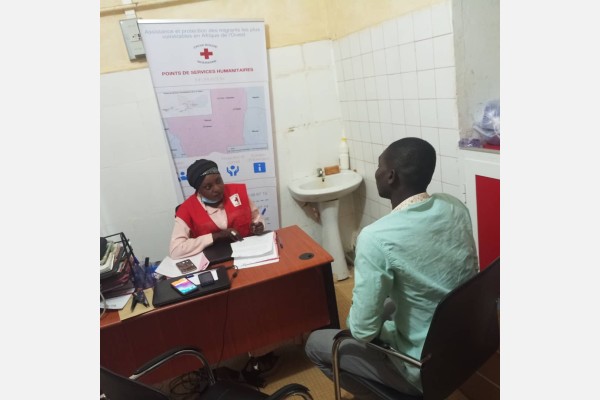Repository of Practices

Cooperation between Red Cross and Red Crescent National Societies and their Governments to provide humanitarian assistance and protection
Dates
Type of practice
Geographic scope
Country:
Regions:
Sub Regions:
Summary
The Northwest Africa - Atlantic route refers to the maritime route connecting several countries and territories along the Northwest African coast with the Canary Islands. This route, already active in 2006, saw an increasing number of movements in 2022 and 2023 after a period of comparatively lower flows. The Red Cross and Red Crescent Societies in the region are first responders to the needs of people on the move on the Atlantic route and in the other countries in West Africa through multiple projects, including the IFRC Global Route-Based Migration Programme. National Societies in Senegal, The Gambia, Mali, and Mauritania, as part of this Global Programme, are working with each other, as well as with their respective governments and IOM, to provide assistance and protection to people on the move, including survivors of shipwrecks and other returnees. To facilitate this work, National Societies have signed Memorandums of Understandings with their governments to ensure that they can provide unhindered humanitarian assistance. In The Gambia, for example, the National Society works with the Ministries of Interior and Foreign Affairs and has signed an MoU with The Gambia Immigration Department. The Gambia Red Cross is also part of the National Coordination Mechanism on Migration and participates in relevant working groups with several Ministries and departments. This allows the Red Cross to cooperate with the authorities, including in situations of displacement or migrants being stranded at borders. The National Society has also trained authorities (including border police and security officers) about migrants’ rights and referral pathways to the Red Cross, to facilitate access to assistance such as temporary shelter, food and non-food items, family reunification, life-saving information, first aid, psychosocial support (PSS) and counselling, and medical referrals. The Gambia Red Cross also collaborates with medical facilities, pharmacies, and restaurants to provide free medical care, medication, and food for migrants, including at border crossing points. National Societies in West Africa also coordinate their activities through the Sahel Plus Migration Technical Working Group (Sahel +), of which National Societies in Mali, Mauritania, Burkina Faso, The Gambia, Cape Verde, Guinea Bissau, Guinea Conakry, Niger, Senegal, and Chad are members. Through this coordination platform, National Societies communicate with each other and share or exchange information for learning, coordination, collaboration, and support, and for early information about the conditions of migrants moving along the Transatlantic route. This type of exchange also allows relevant National Societies to prepare themselves to go to the border and assist returnees with transportation to their families, Restoring Family Links services, provide medical assistance including first aid, PSS, food and non-food items, and shelter.
Organizations
Main Implementing Organization(s)
Detailed Information
Partner/Donor Organizations
Benefit and Impact
Key Lessons
Recommendations(if the practice is to be replicated)
Innovation
Additional Resources
Date submitted:
Disclaimer: The content of this practice reflects the views of the implementers and does not necessarily reflect the views of the United Nations, the United Nations Network on Migration, and its members.
More Related Practices:
- Comité de Cultura de Paz y Derechos Humanos
- Strengthening the capacities and frameworks to collect data and evidence on migration, the environment and climate change (MECC) in Mexico
- Encuesta Nacional Migrante de la Argentina (ENMA)
- A Gender-Focused Qualitative Study on Health Care-Seeking Behavior and Access to Tuberculosis Treatment among Mobile Populations from Moldova
- IOM’s Regional Programme Strengthens the Protection of Child Victims across North Africa and Key Routes
Peer Reviewer Feedback:
*References to Kosovo shall be understood to be in the context of United Nations Security Council resolution 1244 (1999).
Newsletter
Subscribe to our newsletter.